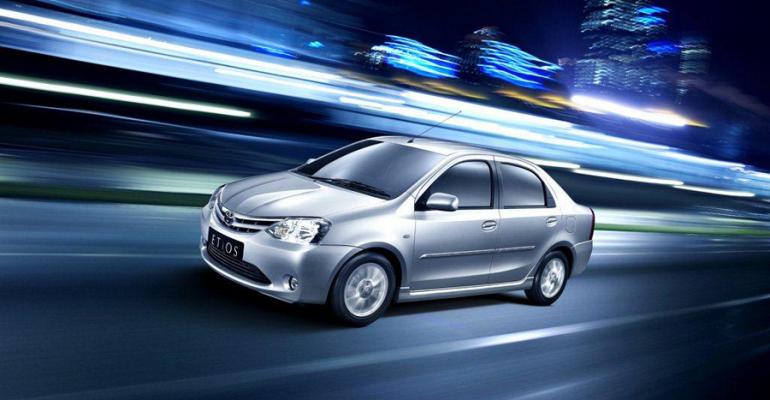MUMBAI – Toyota Kirloskar’s sales numbers in India are up, and so is the size of its investment in the country.
But ineffective, unfocused marketing may be preventing the auto maker from becoming even more of a force in the Indian market.
Toyota ranked fifth in India car sales year-to-date with 49,284 deliveries, WardsAuto data shows, an 85.7% improvement over a first-half 2011 that saw production crippled by the Japanese tsunami and earthquake.
Sales of its latest Etios small sedan have exceeded 100,000 units in the past 18 months, and there is a long waiting list of would-be buyers. Specially developed for the Indian market, the Etios also has made its way to Brazil and South Africa. Toyota is investing Rs9 billion ($161 million) in Indian plants to increase capacity to 310,000 vehicles annually.
Toyota also is considering setting up a diesel engine plant in India. Diesels are capturing an increasingly larger share of the Indian market, but approval for the plant is yet to come from top management in Japan.
“India is an important market for these new models, but no decision has yet been taken on the models and the timing for the Indian launches,” says Sandeep Singh, Toyota Kirloskar deputy managing director.
“It will take Toyota five years to attain leadership in India,” adds Singh, providing what some observers consider a reflection of the auto maker’s problem. Its decision making is so deliberate that by the time the company is ready to act, trends have changed.
Toyota’s SUVs and multipurpose vehicles have done well in India. It has built a strong image with the Qualis MPV, followed by the Fortuner SUV and the hugely successful Innova minivan. But the auto maker has put more emphasis on the three vehicles’ commercial applications than on personal usage.
Toyota sensed long before any of its rivals that rather than move up into bigger and more-expensive cars, small-car customers would prefer affordable, comfortable and spacious utility vehicles with car-like features.
The auto maker has made an indelible mark on India’s utilities segment, which is expected to grow 15% to 20% over the next five years with Maruti Suzuki’s Ertiga, Mahindra’s Xylo, Scorpio and XUV 500, and the mini Xylo and Ford EcoSport joining or having joined the field.
Its success with utility vehicles arguably has put Toyota’s marketing of cars out of focus.
The Etios and its Etios Liva hatchback derivative did catch the imagination of car buyers. But Toyota has taken a long time to meet demand, and waiting lists for both models are growing.
The Etios also is at one end of the gap in the auto maker’s India model lineup, with the Corolla Altis midsize sedan at the other in power, torque, fuel efficiency – and price, Rs200,000 to Rs400,000 ($3,600 to $7,200), respectively.
There are no direct signs Toyota has any plans to close these gaps and offer a wider range of continuous choice. However, there are reports the auto maker soon will launch a smaller version of its Avanza MPV, a new MPV built on the Etios platform and the Rush compact SUV, the latter vying against Renault’s new Duster just launched in India.
Perhaps the greatest problem Toyota is facing in India is the perception that it has not lived up to its promise of quality and durability.
Managing Director Hiroshi Nakagawa praises the safety features of the shared-platform Liva and Etios. Today’s car buyers often take safety for granted and base their choices on the car’s features, performance and price. But Toyota’s marketing of the Liva and Etios emphasizes safety over the overall product.
Toyota is being proactive in some areas. After the falling rupee caused losses of Rs600 million ($10.8 million) from January through April on imports of fully assembled Camry models, the auto maker now is assembling the car locally. It also is considering exporting India-built Camrys to China, Brazil and Indonesia to recover the exchange losses.
Toyota Financial Services has opened in India with an investment of Rs2.6 billion ($46 million). The auto maker also is opening 25 dealerships in smaller cities and rural areas, aiming for monthly sales of at least 500 units.
Toyota ranks fourth in year-to-date sales in India, far behind Maruti Suzuki, Hyundai and Tata, according to WardsAuto data. But fewer than 10,000 deliveries separate Ford, Honda and General Motors India from Toyota, whose cautious approach to doing business in the country may prove to be a self-imposed roadblock.





